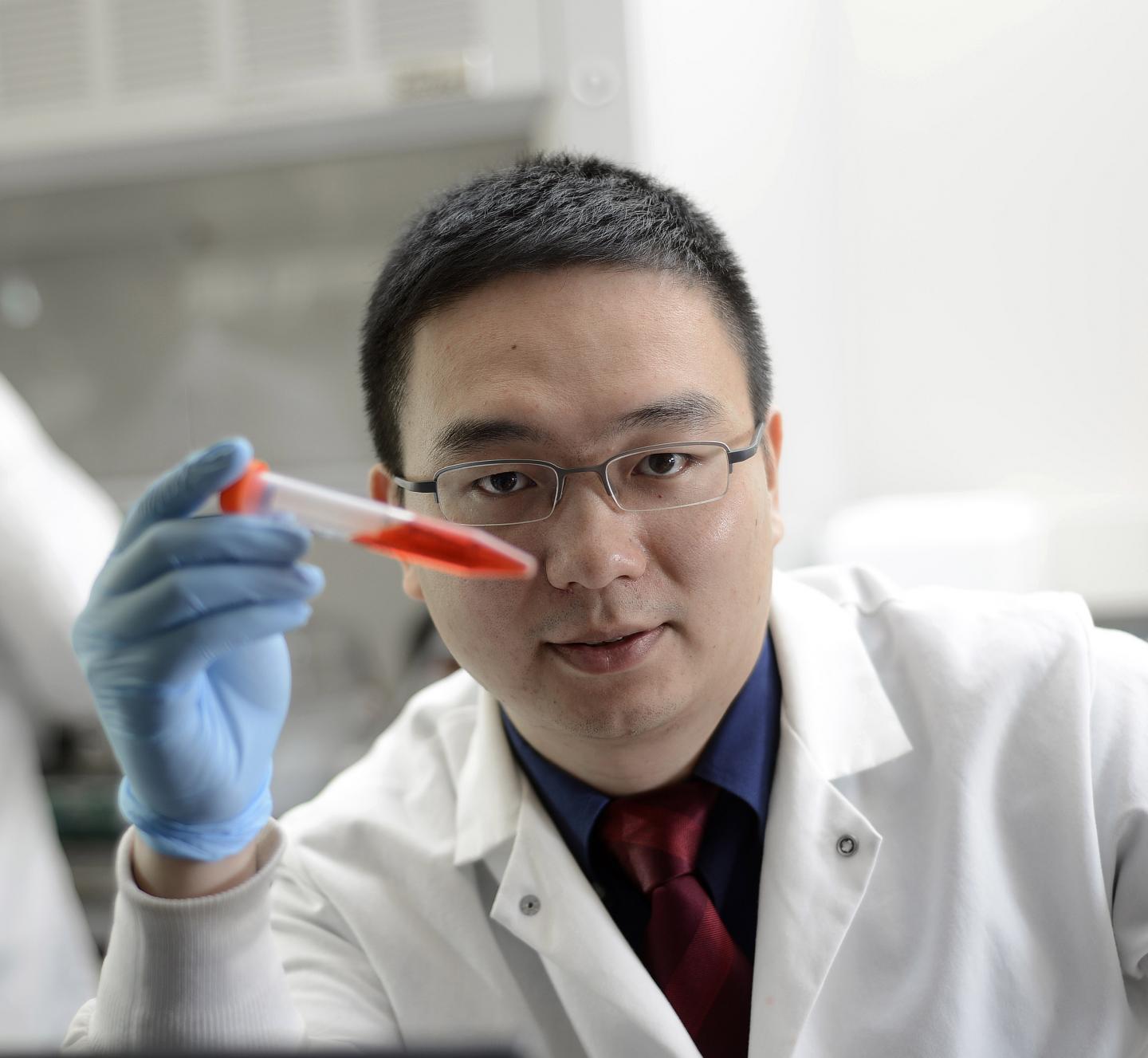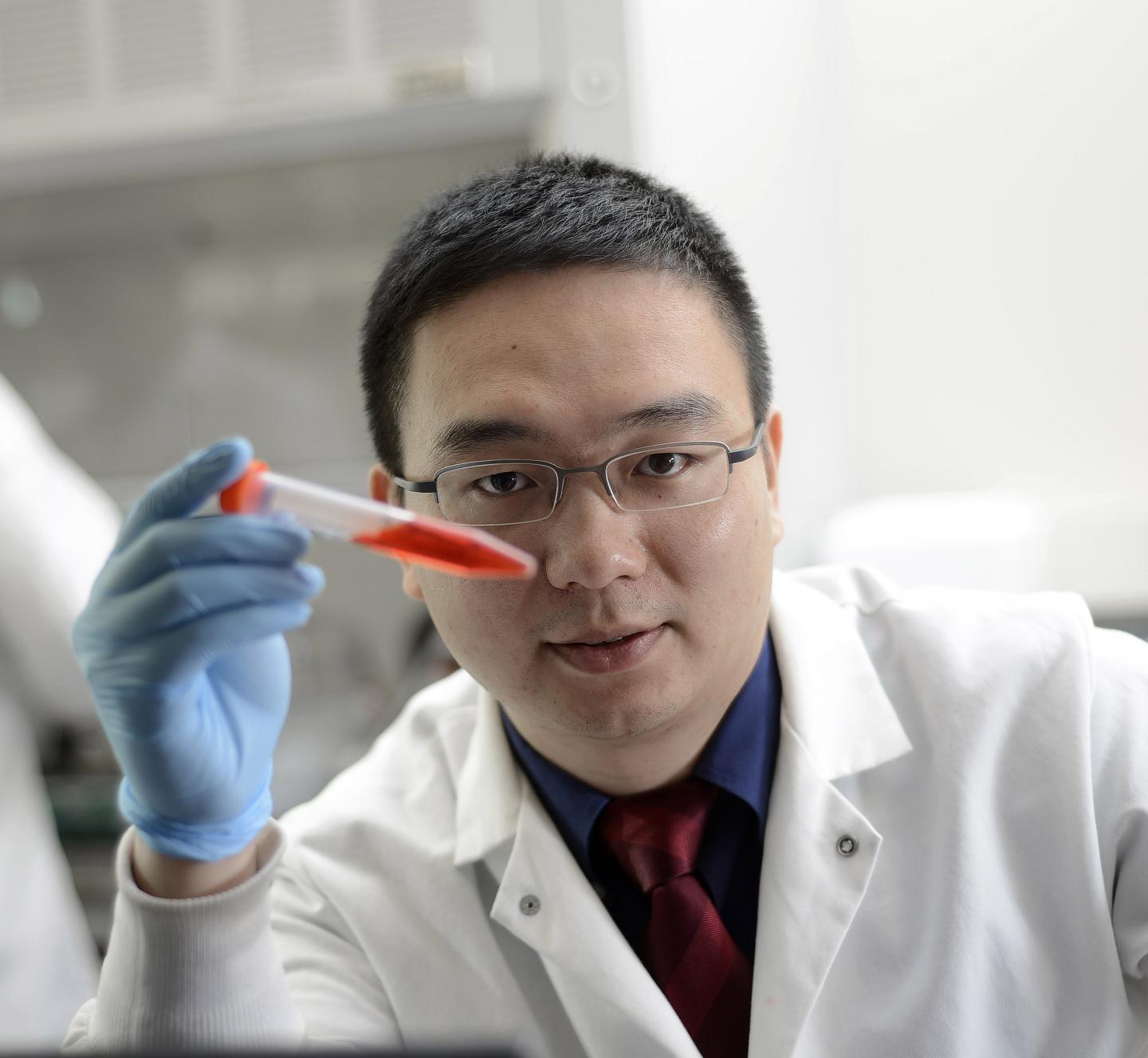
Credit: Photo courtesy of UNC-NC State Joint Biomedical Engineering Program.
After surgery to remove a cancerous tumor — even if the surgery is considered "successful" — it's nearly impossible to ensure that all microtumors have been removed from the surgical site. Cancer recurrence is always a major concern.
Meanwhile, tiny blood cells called platelets rush in to start the post-surgical healing process. What if those platelets could carry anti-cancer drugs to wipe out those microtumors? UNC and NC State scientists have developed a way to do just that, and they have shown success in animal studies, published today in Nature Biomedical Engineering.
"Our goal was to study a new and effective way to treat cancer patients after they have surgery," said Zhen Gu, PhD, the senior author who holds joint faculty positions at the UNC School of Medicine, UNC Eshelman School of Pharmacy and NC State University College of Engineering.
"There has been tremendous interest in developing new, effective strategies to prevent cancer recurrence after surgery. Among them, cancer immunotherapy has received considerable attention. But immunotherapeutic agents do not directly attack the tumor; they use the body's immune system to kill cancer cells."
However, immune cells may be blocked by inhibitory molecules, which serve as checkpoints to alleviate or "turn off" the immune system response, Gu explained. Cancer cells can leverage such mechanisms to escape the immune system response. The cancer cells' defense strategy can be overcome by immune checkpoint inhibitor agents, including anti-PD-1/PD-L1 antibodies, several kinds of which have received fast-track approval from the U.S. Food and Drug Administration (FDA).
"But challenges remain in order for these inhibitor antibodies to be used effectively in patients," said Chao Wang, PhD, the paper's lead author and a postdoctoral researcher on Gu's team. "Currently, the antibodies cannot target the tumor site effectively. The off-target antibodies and overdose usage of antibodies can cause side effects such as an autoimmune disorder, which can damage normal tissue cells."
To overcome these problems, Gu's research team used immunotherapy to directly target residual tumors after a surgery or surgeries to remove the primary tumor, rather than to nonspecifically bolster the immune system. Gu's team engineered a new method to attach specific cancer-fighting antibodies to the surface of platelets, which then travel to a wound site to kill cancerous microtumors or circulating tumor cells. This way, the negative side effects could be avoided.
Cancer can become deadly after surgery to remove a primary tumor because of the possibility of recurrence of the cancer at the surgery site and other parts of the body. Also, there's a possibility that tumor cells will circulate through the body after surgery.
"We wanted to utilize platelets' intrinsic tendencies to accumulate at wounds and to interact with circulating tumor cells, for targeted delivery of immune checkpoint inhibitors" said Gu, "Interestingly, we found the antibody can be promoted to release from activated platelets in the surgical site, due to generation of small platelet-derived microparticles upon the platelet activation. Also, aggregated platelets can help attract and boost immune cells in the surgical site."
Using animal models (some mice had melanoma tumors; some had triple-negative breast cancer tumors) Gu's team set out to target the tumors with checkpoint inhibitor-laden platelets, which were drawn to the surgical bed to attack the remaining microtumors. To mimic metastasis, Gu's team introduced circulating tumors to the mice, which they were also able to combat.
Gu's team used atezolizumab, an anti-PDL1 inhibitor, which was recently fast-tracked by the FDA. For the mice that received the treatment — compared to their placebo counterparts — the treatment "significantly" prolonged overall survivor after surgery by reducing the risk of cancer regrowth and metastatic spread, Gu said.
"It's going to be a broader technology to treat a variety of tumors. That's why we applied different cancer types – not just for solid tumors, but for cancers like leukemia," Gu said. "Leukemia is a liquid, circulating tumor, while breast tumors and melanoma are solid tumors, so this is going to be a very broad technology."
In addition to anti-tumor responses, immune checkpoint inhibitors have also been associated with long-term remission in a subset of patients, Gu said.
"Dr. Gu's work represents an exciting and elegant technological advance in targeted therapeutics for cancer," said Melina Kibbe, MD, professor and chair of the department of surgery at UNC. "By engineering platelets to release PDL1 via microparticles overcomes several challenges currently facing cancer therapeutics. Specifically, Dr. Gu's approach could avoid off-target systemic side effects by allowing for concentrated drug delivery at the site of interest. While much remains to be elucidated with this technology, there is great potential to have a dramatic impact on the care of patients with cancer."
Cancer can still be deadly, even after surgery to remove the primary tumor because the cancer can metastasize in other parts of the body, and because circulating tumor cells can remain after surgery.
"We need new approaches to address cancer metastasis and circulating tumors after surgery, and we think we're on the right track using platelets laced with antibodies to kill various types of cancers," Gu said.
This study was funded by the National Institutes of Health, the Alfred P. Sloan Foundation, NC TraCS and a pilot grant from the UNC Cancer Center.
###
Authors, in addition to Gu, include Chao Wang, PhD, Joint Department of Biomedical Engineering, UNC and N.C. State University, Division of Molecular Pharmaceutics and Center for Nanotechnology in Drug Delivery, UNC Eshelman School of Pharmacy; Wujin Sun, PhD, Joint Department of Biomedical Engineering, UNC and N.C. State University, Division of Molecular Pharmaceutics and Center for Nanotechnology in Drug Delivery, UNC Eshelman School of Pharmacy; Quanyin Hu, PhD, Joint Department of Biomedical Engineering, UNC and N.C. State University, Division of Molecular Pharmaceutics and Center for Nanotechnology in Drug Delivery, UNC Eshelman School of Pharmacy; and Hunter Bomba, Joint Department of Biomedical Engineering, UNC and N.C. State University.
Media Contact
Caroline Curran
[email protected]
984-974-1146
@UNC_Health_Care
############
Story Source: Materials provided by Scienmag





